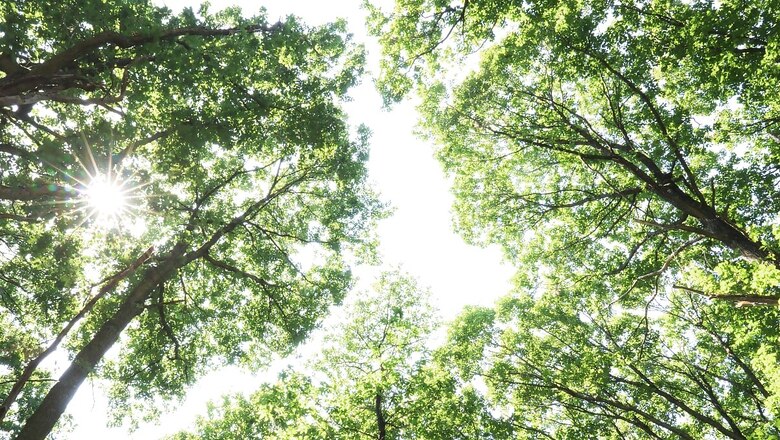
views
Trees stand as silent heroes around us. Generous and magnanimous, gently offering us and the environment its myriad benefits. We are well-aware of quite a few – from purifying air, preventing soil erosion to managing water cycles. However, there are many other ways by which trees contribute to our ecosystem that we often tend to overlook. Let’s delve into 10 of them.
- Biodiversity Hotspots: Trees are bustling communities in themselves, hosting a diverse array of life, from birds nesting on their branches to insects crawling on their bark. They provide home and food to numerous creatures, contributing to a vibrant ecosystem where each species plays a vital role. By nurturing this diversity, trees help maintain a healthy balance in nature, ensuring a thriving environment for all living beings.
- Climate Moderators: Trees act as natural climate moderators by regulating temperatures. They help cool the air during hot days, preventing adverse situations like heat waves from unleashing. This natural regulation not only enhances human comfort but also contributes to energy savings by reducing the need for artificial cooling in urban environments.
- Underground Networks: Trees engage in a remarkable form of communication through their root systems, often referred to as the “Wood Wide Web”. These roots hold water, micro-organisms, etc, providing a channel of nutrients for the soil. This keeps our land fertile and productive. It also supports the health and survival of the network of plants around the area.
- Climate Change Resilience: Trees contribute to resilience against climate change not only by sequestering carbon but also buffering extreme weather events. That is why forested areas are less prone to landslides, avalanches, and other natural disasters, providing stability to vulnerable landscapes.
- Medicinal Treasure Troves: Many life-saving medicines are derived from herbs and tree compounds. For instance, neem, turmeric, tulsi, and many other such plants are valued for their antibacterial and anti-inflammatory properties. Rich in herbs, India’s diverse flora inspire both traditional and modern medical research globally.
- Pollinator Havens: Trees offer vital habitats and food sources for pollinators, such as bees, butterflies, and birds. These pollinators, in turn, are essential for the reproduction of many flowering plants, including those critical to our food supply. What a beautiful balance of nature’s ecosystem, isn’t it?
- Natural Sound Buffers: Trees absorb and deflect sound waves, reducing noise pollution in urban environments and creating peaceful retreats. Their leaves, branches, and trunks act as acoustic barriers, dampening the impact of traffic, construction, and industrial sounds, thus improving the quality of life for city dwellers.
- Mental Health Benefits: Spending time amidst green spaces has the power to enhance cognitive function, boost memory, and increase attention span. In India, the tradition of “Vanavasa” or “living in the forest” reflects an ancient belief in the healing power of nature. Today, various wellness retreats and yoga centers across India incorporate elements of nature therapy and eco-friendly practices to promote holistic health and well-being.
- Heritage and Cultural Significance: Trees often hold cultural and historical significance, serving as symbols of heritage and continuity. The Indian banyan tree Thimmamma Marrimanu, for instance, is a globally recognized marvel. Over 800 years old, it has the world’s largest canopy, spanning an astonishing 2.19 hectares with nearly 4,000 roots, and stands as a living testament to India’s rich natural heritage and biodiversity.
- Economic Benefits: Beyond their ecological roles, trees contribute to economies through timber, fruits, nuts, and other forest products, supporting livelihoods. Agroforestry practices, for example, integrate trees into agricultural landscapes, enhancing crop yields, generating income sources, and providing sustainable farming solutions for communities.
Trees have an irreplaceable value and a profound impact on our planet. They are not just silent witnesses to history but vital architects of our future, sustaining ecosystems, economies, and human well-being. Each tree we cherish today will stand as a guardian of our environment, a symbol of life, and a beacon of hope for generations to come.
Imagine the difference we can make with just a sapling and the impact it can have on our lives and Mother Earth.
To make a difference, News18 Network, India’s largest news network, is launching ‘Project One Tree’, a movement aiming to mobilize every Indian to plant a tree as a measure against climate change. This marquee movement seeks to raise awareness about environmental conservation and foster collective action towards a greener, more sustainable future.
Stay tuned as we’re about to begin a transformative journey; and you can be a part of it too!



















Comments
0 comment